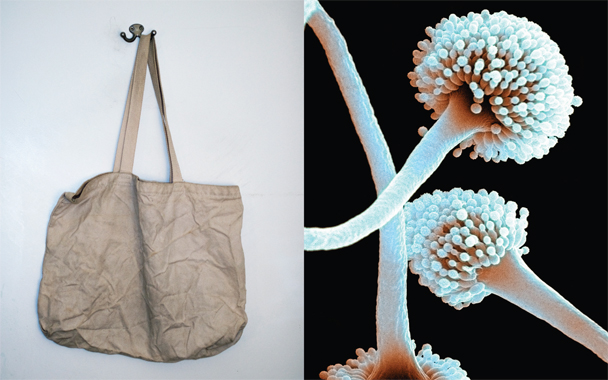Despite the best of intentions, and for a long time after I knew better, I frequently pulled into the grocery store parking lot only to discover that I had left my reusable canvas shopping bags at home. The situation was resolved when I eventually acquired enough free reusable bags from various conferences and product promotions to reach a critical mass. Every week or so, I grab a half dozen or so and toss them into the backseat of the car.
There (provided that the kids haven’t tossed them on the floor and kicked them around with muddy boots), they provide comfortable bedding material for my little mutt, Elvis.
I viewed the occasional stains they bore as badges of environmental honor, evidence that my bags were well used. So you can imagine my shock last week when I came across a study from a Toronto-based company called Sporometrics (even the same suggested something creepy) that found high levels of coliform bacteria, yeast, and mold in reusable bags. Could this be true? I decided to look a bit farther.
Researchers with Sporometrics—a firm that specializes in testing for fungal and bacterial contamination in indoor air, building materials, and other environments—obtained 25 reusable grocery bags through what the scientists refer to as “street intercepts.” In layperson’s terms, they accosted shoppers and offered to swap brand new bags for old ones (which ranged in age from one month to three years). Back in the lab, the bags were swabbed. Nearly two thirds of them showed some bacterial contamination, and 30 percent had bacterial counts higher than those considered safe for drinking water.
The researchers sounded a warning. “The test findings clearly support concerns that reusable grocery bags can become an active microbial habitat and breeding ground for bacteria, yeast, mold, and coliforms,” wrote Sporometrics director of research, Dr. Richard Summerbell. He concluded that “the drafting of protocols on the hygienic use of reusables should be considered a public health policy priority.”
In the face of such dire-seeming conclusions, I feared that I would have to jettison my collection of reusable bags (or relegate them to becoming permanent backseat bedding for Elvis). Then I noticed who had paid for the study: a group called the Environment and Plastics Industry Council, part of the Canadian Plastics Industry Association, a trade organization representing manufacturers of plastic grocery bags (among other products). Item Number One of the association’s Vision Statement declares that the group will be “speaking with one strong, credible voice on behalf of the plastics industry.” Presumably, some folks in the plastics business benefit from selling more non-reusable grocery bags.
Even the industry-backed researchers found neither E. coli nor salmonella, the two bacteria responsible recent headline-grabbing outbreaks of food poisoning, on any of the bags. “I definitely think that this is their last, final, desperate attempt to scare people off reusable bags,” Heather Marshall of the Toronto Environmental Alliance told FoodProductionDaily.com.
The plastics-industry study comes on the heels of a decision by Loblaw (a large, Canada-wide supermarket chain) to begin charging customers for plastic bags in an effort to divert 1 billion bags from landfills. The company issued a statement saying that it stood by reusable bags despite the Sporometrics findings. “Food items placed into reusable bags, for the most part, do not come in direct contact with the bag given their product packaging,” Loblaw vice president Inge van den Berg told The Canadian Press in an e-mail. “Perishable items are put in plastic bags or other types of wrap packaging prior to being placed into the reusable bag, providing minimal opportunity for contamination of the bag.”
“I don’t think we need to go back to disposing billions of plastic bags across Canada,” World Wildlife Federation spokesman Steven Price added. “We need to take care of the objectives, which is to be safe and healthy, so let’s wash the bags.”
I guess I’ll start tossing my battle-weary bags in the washer a little more often. It couldn’t hurt; it will add to that well-used patina, and Elvis won’t object.




 Pinterest
Pinterest


